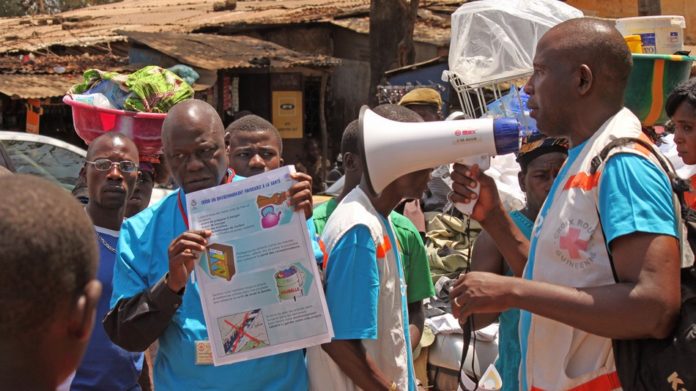Fear and Rumors Hinder Containment of Ebola Outbreak

Health workers teach people about the Ebola virus and how to prevent infection, in Conakry, Guinea March 31, 2014.
While scientists dig for clues that could help develop medicine or better vaccine, the only prevention technique remains isolation. And despite health care workers who wear hazmat-like suits, use bleach as soap, and burn bedding instead of washing and re-using, the World Health Organization announced today that the virus has killed at least 467 people and spread throughout Guinea, Sierra Leone and Liberia, making this the most deadly and farthest-reaching outbreak of the disease since it first appeared in 1976.
While containment is possible in theory, breaks in protocol compromise the effort — and are common in countries where both the disease and foreign medical workers are feared. In one Sierra Leone village, residents burned down the treatment center, convinced that the patients were being given medicine that caused the disease. And some patients escape hospitals to hide.
“Rumors are rife that if you eat three large onions, for example, you won’t get Ebola — but if you go to the hospital, you will get it,” said Dan Epstein, a WHO spokesman in Switzerland.
One of the most revered local customs could account for much of the disease’s spread, Ebola experts say: Local tradition calls for washing a corpse before it is buried, putting everyone who participates in the ritual in touch with bodily fluids that contain the virus.
“The cultural practices are so deeply embedded that local people have told health care workers that if they did not adhere to the ablutions (ritual washing of the corpse), they would be shunning by everyone in their family and village,” said Dr. William Schaffner, an infectious disease specialist at Vanderbilt University Medical Center.
Government task forces have run radio and television ads to try to counter the myths, but mistrust of the government can render them ineffective, said Epstein.
In a perfect world, the virus could be contained through isolation and tracking, he said.
“You would have all the people who were infected immediately go to a health clinic and be put in an isolation ward, cared for by nurses and doctors in full personal protective equipment,” Epstein said. “Also in a perfect world, you’d be able to go into the villages where there have been outbreaks without opposition and be able to tell people that their burial practices are dangerous to their community.”
You’d also be able to trace every person that every infected person had recent contact with and monitor them for symptoms, important for a disease that can have a 21-day incubation period, he said — much as the U.S. Centers for Disease Control and Prevention did last spring with a MERS case in Indiana. That’s one reason experts don’t think the disease will impact countries with certain health care protocols already in place, like the U.S.
The reality in West Africa, however, is nowhere near that best-case scenario. In fact, the area may be especially conducive to the disease’s spread — perhaps even more so than in Central Africa, where the disease had been found previously. West Africa’s road system and higher population density make travel easier — and containment harder, said Robert Garry, a microbiology professor at Tulane University School of Medicine who recently returned from West Africa, where he has been working on Lassa fever efforts for years. Garry believes that because not every case has been reported or tracked, we may be seeing just the tip of the iceberg.
“I don’t think it’s going to be over anytime soon. Each one of those infected [and not reported] people could infect 10 more — or hundreds,” he said.
International health organizations, including the WHO and Doctors Without Borders, have said they have reached their limits, and that more government intervention — “drastic action” — is needed. A meeting of health ministers from 11 countries to explore ways to prevent the virus from spreading will be held Wednesday and Thursday.

